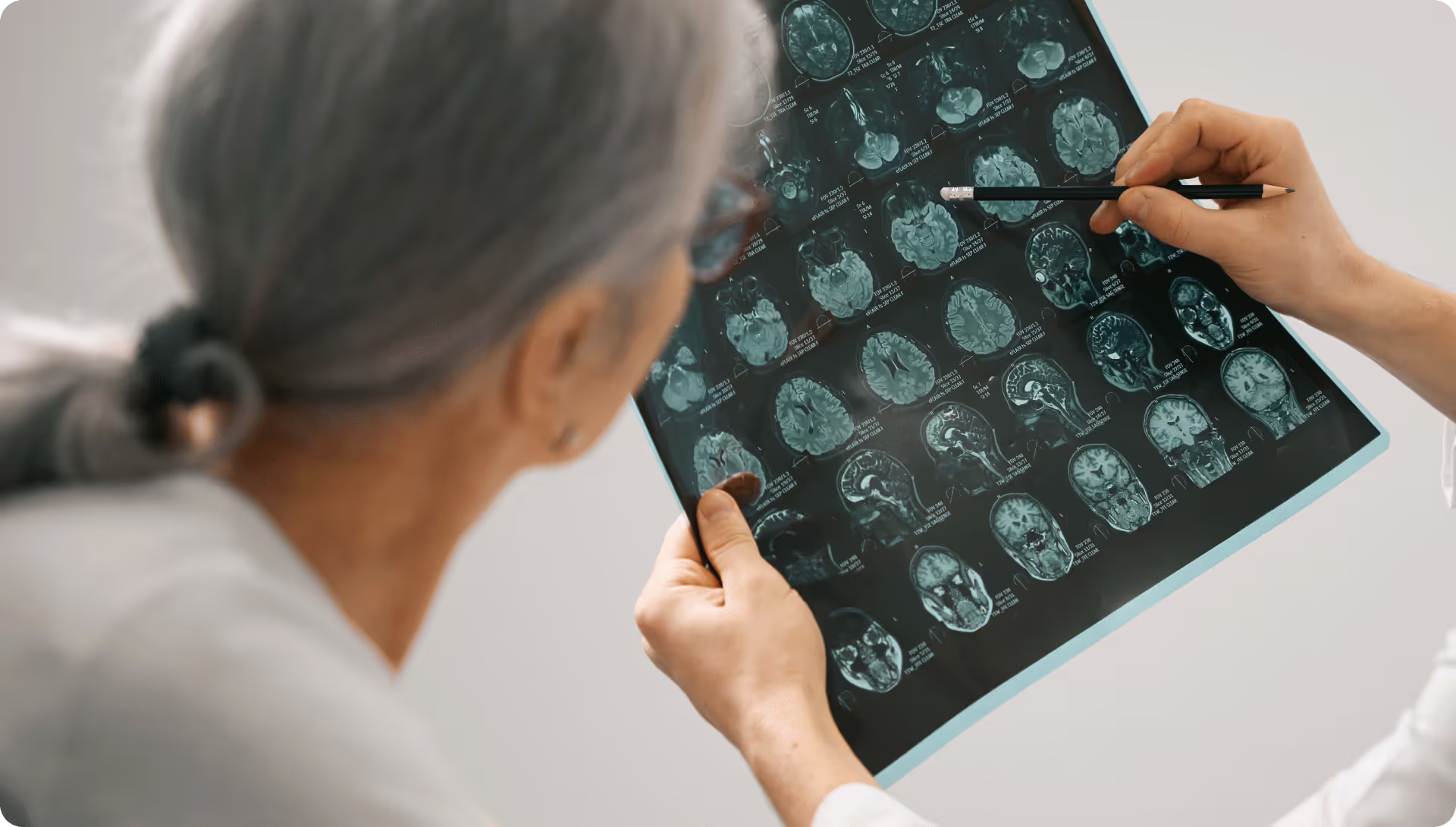
Early detection is paramount, the earlier we confirm what’s going on, the more options we can offer. We evaluate and treat the full spectrum of cognitive disorders, including:
- Alzheimer’s Disease
- Mild Cognitive Impairment (MCI)
- Dementia with Lewy Bodies (DLB)
- Parkinson’s Disease Dementia (PDD)
- Frontotemporal Dementia (FTD)
- Behavioral Variant FTD
- Primary Progressive Aphasias (PPA)
- Posterior Cortical Atrophy (PCA)
- Vascular Dementia
- Less common causes with cognitive involvement, including, cerebral amyloid angiopathy
Common Symptoms
- Memory loss that disrupts daily life, repeating questions or misplacing items
- Difficulty completing familiar tasks
- Confusion about time, place or people
- Trouble with language, problem-solving or judgment
- Changes in mood, personality, sleep or behavior
- Increasing reliance on family or caregivers
- Visual–spatial problems (for example, trouble reading, navigating or judging distances, common in PCA)
Our Diagnostic Process
We move beyond a quick screen to a structured, stepwise evaluation aimed at clarity and early detection. First appointments are in person to enable a full neurological exam, many follow ups can be done by video.
Clinical evaluation (in-person first visit)
Detailed history, neurological exam and review of prior records and imaging
Cognitive testing (baseline and every ~6 months)
Standardized assessments to measure memory, attention, language and executive function that help stage the condition and track change
Advanced diagnostics as indicated
- MRI (and CT if needed)
- PET imaging including amyloid PET when appropriate
- Laboratory tests
Specialized biomarker testing (case-dependent)
- Blood-based Alzheimer’s biomarkers (for example, phospho-tau assays, Aβ ratios)
- Alpha-synuclein testing for Lewy body conditions (for example, skin biopsy or other validated assays)
- Genetic testing and risk stratification (for example, APOE) when clinically appropriate
Candidacy determination
We confirm if you’re a candidate for disease-modifying therapy considering medications, MRI findings such as microbleeds and overall risk profile
Longitudinal tracking
Regular follow-ups (30–60 minutes) and periodic re-testing to monitor progression and adjust care
Treatment Options

Disease-modifying therapies (for early Alzheimer’s)
Our approach combines evidence-based medicine with practical supports for patients and families.
Leqembi® (lecanemab) and Kisunla™ (donanemab)
Monoclonal antibodies targeting beta-amyloid that can slow disease progression in appropriately selected patients. We personalize plans, manage safety monitoring and coordinate infusion scheduling. Typical infusion time is about 90 minutes.
Symptomatic medications
Acetylcholinesterase inhibitors (donepezil, galantamine, rivastigmine including transdermal patch) and Memantine in select cases
Condition-specific management
- DLB/PDD: management of hallucinations, autonomic symptoms and cognitive changes; REM Sleep Behavior Disorder often responds to melatonin or, in select cases, benzodiazepines
- FTD/PPA: behavioral strategies, mood stabilizers, antidepressants or antipsychotics as indicated; individualized speech-language approaches for PPA
- PCA: tailored strategies for visual–perceptual challenges
Cognitive & functional support
Targeted exercises and compensatory strategies to maximize daily function.
Planning & resources
We coordinate with organizations (including the Alzheimer’s Association and local community programs) to help with education, support groups, safety planning and long term care navigation.
Clinical research
We are building a clinical trials and research program, to inquire about these please email us at hello@salmahealth.com
Why Choose Salma Health?
We’ve reimagined how depression care should feel: integrated, proactive and personal.
Personalized care plans
Every treatment plan is tailored to your unique biology, history and goals—not a one-size-fits-all approach
Integrated clinical team
Psychiatrists, neurologists, therapists, specialists and care coordinators work together to ensure no piece of your care happens in isolation
Precision diagnostics
We use advanced tools to understand your brain, not just your symptoms, helping us match you to the right interventions faster
Whole-person focus
We address the mind-body connection, emphasizing emotional, physical and cognitive wellbeing
Ongoing partnership
Care doesn’t stop after one visit. We monitor outcomes and adapt your plan over time as your needs evolve
Get started
If you or a family member are noticing changes or have been told you have MCI or dementia, don’t wait. Early detection gives you more options. Call us or request an appointment to schedule your evaluation.










.avif)
.avif)
.avif)